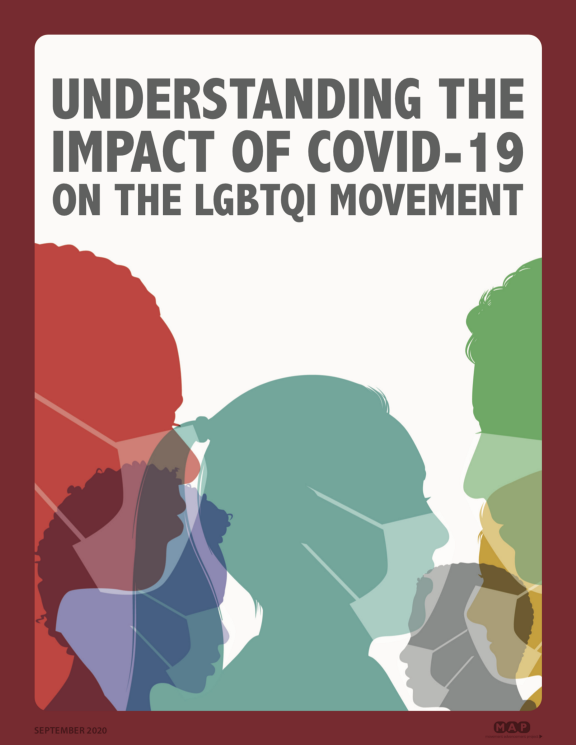This article originally appeared on the LGBT MAP blog.
The COVID-19 pandemic has impacted all of us, making 2020 a year filled with challenges like no other. For individuals and families, workers and businesses, and social change organizations like LGBTQI and allied social justice organizations, COVID-19 has upended how we learn, work, and connect.
To understand the ways in which LGBTQI and allied social justice organizations are responding in this moment, Movement Advancement Project (MAP) conducted several surveys. What emerges is an insightful and helpful snapshot of these organizations’ financial health and short- and long-term planning, staffing, and efforts to ensure program stability in the face of the pandemic.
Access the report: Understanding the Impact of COVID-19 on the LGBTQI Movement
On the whole, organizations are responsive and flexible, relying on government loans and smart expense reductions to continue advocating and serving LGBTQI people. It’s important to note, however, that anticipated reductions in revenues from events, corporations, foundations, and individuals are reason for caution and concern as we look ahead to 2021 and the continued uncertainty brought by the pandemic. The survey results include critical recommendations for how funders can support organizations in the LGBTQI movement.
Facing Declines in Revenue from Donations
Not surprisingly, since the pandemic has halted many in-person events, slowed businesses, and created economic uncertainty for millions of people, the participating organizations also are anticipating declines in revenue. In April 2020, the organizations surveyed by MAP predicted substantial drops in fundraising and program revenue, including roughly 25% decreases in both corporate giving and individual giving.
If those early projected declines come to fruition the result would be $24.1 million in lost revenue for LGBTQI and allied organizations. Findings from the June survey show that 45% of organizations had indeed reduced their 2020 budgets, with an average budget decrease of 17%.
LGBTQI Organizations are Navigating Financial Uncertainty
MAP’s survey results show that LGBTQI organizations are taking a measured approach, making decisions quarter-by-quarter as the situation evolves. The groups are innovative, creative, and resilient as they continue the important work of advancing LGBTQI equality and supporting the communities they serve.
Early in the pandemic prior to receiving federal Payroll Protection Program (PPP) loans, organizations anticipated needing to reduce staffing costs by either freezing hiring for open positions or implementing pay freezes. Additionally, three-quarters indicated plans to cut spending in non-personnel areas, especially in the areas of fundraising events and travel.
By June 2020, organizations had a different outlook in terms of hiring, with 40% of organizations having hired staff in the past 60 days and 53% intending to hire staff in the next 60 days. Given that 40% of organizations reported negative net income without the PPP loans, this hiring may be a direct result of the PPP.
Even after securing PPP loans, organizations are continuing to look for ways to make spending cuts, including finding ways to make lasting changes. For example, organizations plan to close offices and maintain a remote workforce, outsource services, and cut non-essential expenses wherever possible. Many organizations also report reduced travel expenses.
Unique Impact on LGBTQI Community Centers
In an average year, LGBTQI community centers serve more than 40,000 people each week. Given the front-line role that centers play and the fact that they often provide vital in-person services and spaces, the impact of COVID-19 on centers is different than for many other LGBTQI organizations.
For example, when centers are forced to temporarily close during pandemic shut down orders, they may have to invest financial resources to shift operations remotely. To reopen safely and meet health standards, costly changes are required, such as installing plexiglass in front of service desks, limiting the number of people who can enter the center, and added cleaning costs. Despite these costs, two in five participating centers indicated they planned to hire staff in the next 60 days.
Important Role for Funders and Individuals to Support LGBTQI Movement Organizations
LGBTQI and allied organizations continue the important work of improving the lives of LGBTQI people through advocacy and direct services. While organizations are demonstrating the ability to adapt to the current moment and the financial challenges that COVID-19 has meant for fundraising, corporate and foundation giving, and beyond, it is vital that funders and individual donors think strategically and act thoughtfully to ensure the strength and continuity of the movement.
The report offers detailed recommendations that include:
- Offering multi-year and early funding commitments for 2021 and beyond
- Flexibility in grant terms and increased general operating support
- Offering specific financial expertise support
- Focusing on key needs of the movement
As we look ahead to the rest of 2020 and 2021, the work of LGBTQI movement organizations remains critical. In November, the U.S. Supreme Court will consider a landmark case about the ability of governments to enforce nondiscrimination provisions in contracts. The Trump Administration continues to push forward limits on equality, especially targeting transgender people. State legislatures will reconvene in January, and there may be more anti-LGBTQ legislation under consideration. With a presidential election just weeks away and a Supreme Court vacancy, LGBTQI groups will need ongoing financial support to continue the important work of advocacy and direct services for the LGBTQI community.
Take Action
- READ the report: lgbtmap.org/2020-covid-impact-report
- DONATE to support more impactful policy reports like Understanding the Impact of COVID-19 on the LGBTQI Movement
The opinions expressed in this article are those of the author and do not necessarily reflect those of the Diverse Elders Coalition.


